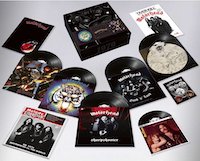 1979 - Motorhead (BMG)
1979 - Motorhead (BMG)
You all know who Motorhead are. You may dig them, you may not – although I can’t fathom how any true rock fan couldn’t. For mine, there has never been a more authentic, hard-hitting, long-lasting, and utterly committed rock band. Frontman Ian “Lemmy” Kilmister frequently opined that they were simply than the dirtiest rock and roll band on the planet, disagreeing with the oft-applied heavy metal label.
As a teenager in the '80s they were definitely metal to me – they were louder, faster, and grittier than anyone else – but with the benefit of hindsight, I understand why he proclaimed: “We Are Motorhead – And We Play Rock And Roll” at the start of every gig for their last few decades. Having said that, without doubt they inspired generations of metal bands, as well as many in other genres.
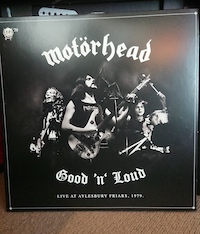 |
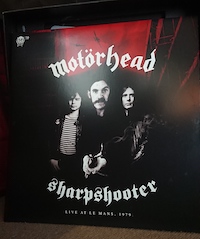 |
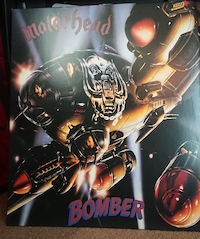 |
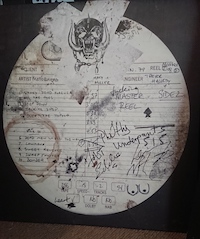 |
Over their 40-year career, they went through five guitarists, four drummers, and one bass player/singer. The line-up of Lemmy on bass and vocals, Fast Eddie Clarke on guitar and occasional vox, and Phil “Philthy Animal” Taylor on drums (his one, short-lived attempt at vocals was described by Lemmy as sounding “like two cats being stapled together”) only spanned 1977-1982, but is regarded as the classic version of the band and this box set shows why. No disrespect to the other line-ups, all of whom delivered the goods in no uncertain fashion, but without this unholy trinity I doubt their career would have been anything like what it was.
After Lemmy’s 1975 sacking from heavy space-rockers Hawkwind for a drug bust for speed on the US/Canadian border (as he said: “the wrong drugs – if it was acid they’d have rallied around me”) he returned to England, shagged various ex-bandmates’ partners, and decided to form the dirtiest rock and roll band in the world, originally to be named “Bastard”.
The famous line “if we moved in next door, your lawn would die” wasn’t far from the truth. Abortive line-ups, dodgy record deals, and an NME review as “the worst band in the world” followed. Undeterred, Lemmy pushed on with a stable line-up (personnel-wise if not lifestyle) and a contract with Bronze Records led them to a place where they straddled the divide between punk and metal – at a time when that really meant something.
A raw and killer 1977 debut album and non-stop touring the UK and Europe in a series of broken-down vans followed. They even cracked the charts and appeared on Top of the Pops in 1978 with a cover of the Kingsmen’s rock staple “Louie Louie”. That must have been something to see among the disco and pop schmaltz of the day. It was the first of many TOTP appearances as they became regulars on UK TV.
And so, to 1979 – the year that turned them into an unstoppable force and that this box set lovingly documents. They released not one but two classic albums, toured relentlessly, took young bands on the road and blooded them, and became the greatest thing since sliced bread if you liked uncompromising, in-your-face rock and roll. They weren’t in the top echelon in terms of sales – that came later, when 1981’s live scorcher “No Sleep Til Hammersmith” debuted in the UK at number-one – but after 1979 they never looked back.
The Box Set overall
This is easily one of the best compilations I’ve ever seen. Despite none of the original members being alive – Lemmy and Philthy passed away in 2015, Fast Eddie in 2018 – this doesn’t reek of cash-in or rip-off. Due to the number of early, dodgy record deals which saw product emerge on countless labels, it’s fair to say there can’t be many more compiled bands than Motorhead, and those compilations range from the sublime (“From the Vaults” -an essential set of B-sides and other rarities) to the ridiculous (“Fast, Loose and Live” which is basically jamming and rehearsal tapes). This box set is sheer quality.
For your money you get a sturdy box (the more expensive of which features a leather sleeve) containing badges, the sheet music to the song “Overkill” (which I can’t imagine the band ever relying on), a replica "Bomber" tour programme with hilarious photos, and a very well put together 40-page newspaper “Melody Breaker” compiling numerous interviews, photos and articles from then and now, including the thoughts of Peter Hook if you are Joy Division/New Order inclined.
But most importantly, you get their two classic 1979 albums “Overkill” and “Bomber”, two double live albums “Good n Loud” and “Sharpshooter” from gigs recorded in the UK and France in March and November respectively, and a mostly cracking compilation album of B-sides, alternate takes, and a couple of studio offcuts. For once in the history of these sort of things it’s actually worthwhile.
There’s also a reproduction of the single “No Class/Like A Nightmare” with the original three cover photos. The albums come bursting out of your speakers (or your Motorheadphones if you have a pair). They’re loud, punchy and dirty. The live ones are best with a bit of extra crank.
"Overkill"
The title track is often credited as inspiring the birth of thrash metal a few years later, thanks to Philthy’s double-kick drum assault. But the things which made Motorhead quite unique among metal, punk, and other noisy genres were Lemmy’s lead guitar style bass, Fast Eddie’s 60s RnB-on-speed wah-heavy guitar assault, and Philthy’s undeniable swing and groove. Nobody really ever successfully sounded like this again, despite more than a few attempts from the nascent New Wave of British Heavy Metal scene. Motorhead were one of a kind, and this album shows why.
There’s no metal flatted fifth guitar riffing, no Sabbath influences, no operatic vocals or lyrics about demons and wizards - nothing really that any of their immediate predecessors or contemporaries turned into clichés. Fast Eddie was a truly individual guitar player, managing to avoid bluesy chestnuts and ponderous riffage, and he was the perfect counterpoint to Lemmy’s brutal but melodic bass assault.
Philthy’s nonstop attack was derided at the time (by idiots) but was the volcanic bedrock the band demanded. Countless drummers have cited his influence since. And then there were the vocals – marinated in Marlboros and rocket fuel, strained through a cement mixer, but soulful and heartfelt.
In later years the lyrics sometimes went in a cartoonish rock direction, but at this point in time, with the band living in squats in the poor end of London - all coming from broke-arse backgrounds and sharing a healthy disrespect for authority and hypocrisy - what this album reeks of is authenticity.
Rather than the shouted slogans of some of their punk contemporaries fresh from art school or university, Motorhead were utterly of and from the streets. Their nearest and dearest punk peers were The Damned, with whom they recorded a split single that is sadly missing from this set, and they shared a healthy “fuck it all” attitude without preaching politics or a world vision.
Lemmy’s message is individualism, and not buckling to authority – and it rings out clearly in tracks like “Stay Clean”, “No Class”, and “(I Won’t) Pay Your Price”. Of course there are more autobiographical tales like “Damage Case” (a paean to his amphetamines-and-sex fuelled lifestyle) and “Tear Ya Down”, but rather than the posing that many frontmen indulge in, you know these are true tales of a gritty life.
The riff in “No Class” owes more than a little to ZZ Top’s “Tush” – and Motorhead had covered their “Beer Drinkers and Hell Raisers” two years earlier – and for mine it’s one of the absolute highlights on this no quarter given album. “Capricorn” and “Metropolis” are slower but no less driving, “I’ll Be Your Sister” grinds along like a steamroller going downhill, and closing track “Limb From Limb” starts slow and ends fast, powering things to a conclusion and featuring Lemmy on guitar (he plays the second solo if you’re into the trainspotting thing and shows his skills on the six string).
Lemmy doesn’t get enough credit for his lyrics. At the time of course, punk and post-punk was all the rage among music journos, and Motorhead’s booze-and-bikies leather-and-denim image just didn’t fit their blinkered view of the world. But very few people could turn out a rhyming couplet or 10 like him, and if you think it’s easy, do it for 40 years and get back to me. Probably nothing sums up his, and their, approach as simply and effectively as: "Only way to feel the noise is when it’s good and loud/So good I can’t believe it, screaming with the crowd" and "Know your body's made to move, feel it in your guts/Rock 'n' roll ain't worth the name if it don't make ya strut" - surely Motorhead’s mission statement from the title track of this absolute five-beers-out-of-five-beers classic.
"Bomber"
Featuring one of the all-time great rock album covers – the band aloft in a souped-up Heinkel He-111 bomber, bedecked with their Snaggletooth logo – their second album of 1979 is, sorry purists, my favourite of the two. The benefits of a few solid years on the road touring two successful albums are obvious here, as the songwriting and musicianship move up a notch.
Side A’s opening track “Dead Men Tell No Tales” – Lemmy’s anti-heroin diatribe – is as good as it gets. Crushing riffs, powerhouse drums, searing vocals, dark themes, bulldozer bass underpinning it all. Despite his own Hoover-like tendencies in all other known areas, Lemmy always hated and publicly despised heroin, blaming it for the loss of friends and the then-love of his life. 'Dead Men Tell No Tales" is just excoriating – “Cause if you’re doing smack, you won’t be coming back/I ain’t the one to raise your bail, dead men tell no tales”.
Side B’s opener “Stone Dead Forever” reflects one of his favourite lyrical themes, the powerful man brought low by his own greed. There’s barely a Motorhead album on which it doesn’t appear. It was probably my favourite Motorhead track when I first heard this album.
I love the lyrics on this record – “All The Aces” skewers the faceless ones at the top of the music industry, “Talking Head” portrays the media then and now, people paid to push other people’s messages. “Bomber”, “Lawman”, and “Sharpshooter” are Lemmy in epic story-telling mode, whether war, trouble with the cops, or less than subtle gunslinger/sexual metaphors. The title track is absolute gold, inspired by the Len Deighton bestselling novel of the era.
The tour of this album introduced the Bomber lighting rig, a tubular steel reproduction of a Heinkel He-111 which flew at dangerously low levels above the stage. There’s a live clip of them in 1979 in which Lemmy hops in for a surely non-WHS approved ride.
“Step Down” features a very rare Fast Eddie lead vocal – apparently he hated doing it, which is sad because he’s good and it gave them a bit of a point of difference – a grinding, psychedelic-through-Marshalls guitar sound with the usual rhythm apocalypse turned down a bit. “Poison” is an absolutely vitriolic song about Lemmy’s father, an Anglican minister who buggered off around 1946 when his son was a toddler and only re-emerged when he started to get a bit successful:
My father, he used to be a preacher
Never taught me nothing but scorn
If I ever catch him on the street, yeah
I'll make him wish he'd never been born because
He was Poison (poison)
And now he poisoned my life
Yeah, he was Poison (poison)
I wish my mother wasn't his wife
Like "Overkill", "Bomber" was produced by the legendary Jimmy Miller, best known for his incredible work in the classic Rolling Stones 1968-'73 era, including playing drums on a few of their best-known songs.
By all accounts, he was a little on the drugged-out side by 1979 – in one interview Lemmy referred to him sitting in the studio carving swastikas into the mixing desk with a penknife for hours, or vanishing into the toilets for hours – but somehow or other these two albums came out sounding amazing. They weren’t like anything that came before – there had been hard rock and metal and punk, but nothing quite like Motorhead. Whatever his failings, and sadly he died in 1994 from liver failure at the age of 52 as a result of them, the man who produced these albums did a fantastic job.
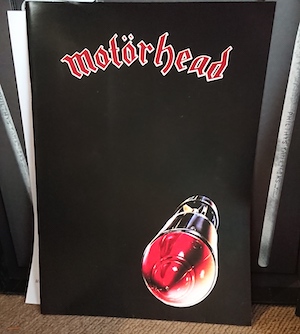 |
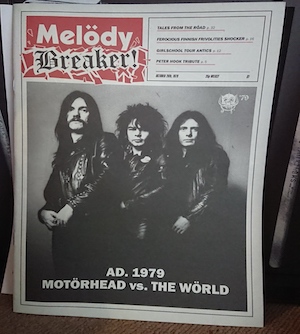 |
The Live Albums
It’s best to remember at the outset that these are just live gig recordings, not recorded to be released as live albums, so the sound quality is not as good as "No Sleep Til Hammersmith". But that simply doesn’t matter because from the opening seconds of “Overkill” on the first album, they are absolutely speeding along – yes – in two smallish venues. It’s a total blitzkrieg and that’s me hearing it with decades of familiarity with the songs. In 1979 this must have been like an out of body experience. If you saw them then, you’re one of those lucky people who will always remember seeing a truly great band on the unstoppable way to their peak.
Both albums are full of genuine club gig experiences – feedback, fart-arsing around, banter (some of which was probably giving the long-suffering road crew a chance to make running repairs). The great thing about the timing of the recordings – early and late 79 – is the variety in the set lists. There’s at least 50 percent difference in them, and not just because of the new "Bomber" songs. They just had a huge repertoire, including fantastic, hard hitting covers like “Train Kept A Rollin”, “Leaving Here”, “I’m Your Witchdoctor” as well as some of Lemmy’s Hawkwind catalogue including “Motorhead” (oh yes) and “The Watcher”.
I’m just going to digress about "The Watcher"; I first heard it as the opening track on the legendary 1978 bootleg “What’s Words Worth” which I somehow stumbled across second hand in the mid-80s. It just disappeared from their set by mid-79. The original is quiet and hippy and a bit haunting, the Motorhead version is raucous and driving. I’m so stoked to finally have another version. If I have to be honest, it’s is the number-one reason I wanted this box set for Xmas.
Lemmy’s interaction with the crowds is great on both albums, very funny and you can tell it’s all pretty face-to-face (“Fuck off, you can’t all be bikers”). As I’m typing this by the way, “Leaving Here” came on, and it’s an absolute blitzkrieg. My band covers it, I think we go pretty hard, and I shudder to think how much amphetamine and amplification you need to get it to sound like that.
These are very live, very raw albums with plenty of funny stage banter (and the occasional ominous “fuckin’ ‘ell” or “I’m sick of tunin’ this fuckin’ thing” from Eddie). You get the full spectrum of the first four years of Motorhead’s career across these records – and despite their reputation as a non-stop assault there’s actually plenty of variety here. You can smell the blood, sweat, and beers. And the speed and nicotine. (“How many of you over thirty? Three? Fuckin ‘ell, none of you are gonna remember this then”)
The Bonus Album
Motorhead recorded a lot of non-album cuts which have emerged on various compilations. I don’t remember hearing any of these before. There’s a couple of B-sides, a bunch of alternative takes, and three outtakes. I’ve crapped on long enough, so in one sentence each:
“Too Late, Too Late” – the B-side of the “Overkill” single and a slightly slower version of one of their best songs, well worth hearing it in development.
“Like A Nightmare” – an alternative version of a B-side and not the highlight of this record.
“Over The Top” – the B-side of the “Bomber” single and easily one of their best tracks - if any one Motorhead song sums them up, this is it. “It’s not that I’m bad, it’s just that I’m mad, I’m a boogaloo” – testify, Lemmy.
“Stone Dead Forever” (alternative take) – one of their all-time greatest songs but this version has Fast Eddie on vocals, and while he’s no Lemmy, he smashes it.
‘Sharpshooter” (alternative take) – pretty close to the album version, a bit rawer sounding, like a great live take.
“Bomber” (alternative take) – no guitar overdubs and a rawer take, the rhythm section absolutely cranking.
“Step Down” (alternative take) – again, no guitar overdubs, Eddie’s soloing to the fore and Lemmy’s bass throb filling the gaps, a heavy, grinding take and Eddie hooks into his vocal turn with venom.
“Fun On The Farm” (unreleased) – An instrumental, which varies between sounding “fully worked up song” and “what do we do in this bit?”.
“Treat Me Nice” (unreleased) – Imagine Motorhead doing a slow, sleazy 12 bar blues by numbers for fun at rehearsals – yes, I know, it’s not exactly a quantum leap – it’s not bad but it’s not great.
“You Ain’t Gonna Live Forever” (unreleased) – sounds like another jam that they half worked up, but it cranks along and they smash it out.
So there you go. It’s essential if you love them. The live albums will be getting plenty of plays around these parts, and the official albums have been on regular rotation since I acquired them second hand in the '80s. No band rocked harder in 1979 than Motorhead and this box set proves it. You may disagree, but as Lemmy said a few years later: “Write your opinion on a Beatle wig and send it to someone who gives a damn”.

